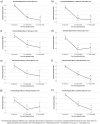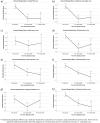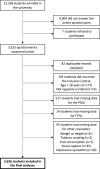Relationship between free-time physical activity and sleep quality in Brazilian university students
- PMID: 37095143
- PMCID: PMC10125990
- DOI: 10.1038/s41598-023-33851-3
Relationship between free-time physical activity and sleep quality in Brazilian university students
Abstract
Poor sleep quality and low or no free-time physical activity (FTPA) practice are highly prevalent among university students, but the association between these conditions is still unclear. This cross-sectional study analyzed the relationship between FTPA and sleep quality. An online questionnaire was conducted with university students from a public university in southern Brazil in 2019. The weekly frequency of FTPA was self-reported, and sleep quality was assessed using the Pittsburgh Sleep Quality Index (PSQI). Logistic regression and ANCOVA models were performed and adjusted for confounders. Among the 2,626 students analyzed, 52.2% did not practice the FTPA, and 75.6% had poor sleep quality (PSQI > 5). In the adjusted analysis, practicing FTPA 4-7 times/week was associated with poor sleep quality (odds ratio = 0.71; 95% confidence interval = 0.52, 0.97) compared with not practicing FTPA. In addition, those who practiced FTPA had significantly lower means of the global PSQI, subjective sleep quality and duration, sleep disturbances, and daytime dysfunction scores than those who did not practice FTPA. In conclusion, the FTPA may contribute to better sleep quality among university students.
© 2023. The Author(s).
Conflict of interest statement
The authors declare no competing interests.
Figures



References
MeSH terms
Substances
LinkOut - more resources
Full Text Sources
Medical

